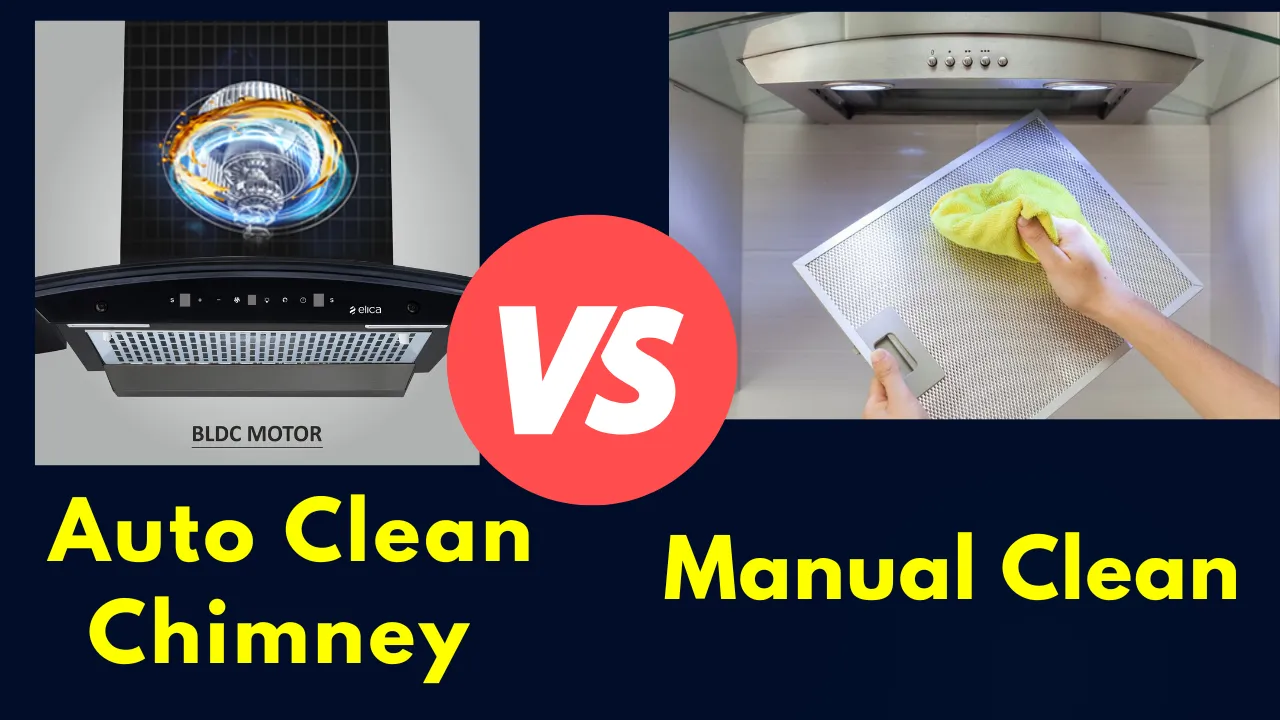Auto-clean chimneys use heat to clean themselves, so you don’t have to do anything. They also have strong suction to remove smoke and smell better.
But they cost more than manual chimneys. Let’s compare Auto Clean Chimney vs Manual Clean and see which one is best for you!
Is Auto Clean Chimney Better?
Yes, auto clean chimneys are generally considered better than manual clean chimneys. They offer several advantages, such as:
- Easier maintenance: With just the press of a button, an auto clean chimney will clean itself internally using water, heat, or steam. This means less time and effort spent on cleaning for you.
- Higher suction power: Auto clean chimneys typically have more powerful blowers that can suck up smoke and grease more effectively than manual chimneys.
- Longer lifespan: Because auto clean chimneys prevent grease buildup, they tend to last longer than manual chimneys.
However, auto clean chimneys also have some drawbacks, such as a higher upfront cost and more complex mechanisms that may be more expensive to repair.
Auto Clean Chimney vs Manual Clean: Pros and Cons
Here’s a quick comparison of the pros and cons of auto clean chimneys and manual clean chimneys:
| Feature | Auto Clean Chimney | Manual Clean Chimney |
| Cleaning | Automatic, easy | Manual, takes time |
| Suction Power | Strong | Weaker |
| Maintenance | Easy, low effort | Hard, needs frequent cleaning |
| Lifespan | Lasts longer | Shorter lifespan |
| Price | Costs more | Cheaper upfront |
As you can see, auto clean chimneys offer greater convenience and performance, but at a higher price point. Manual clean chimneys are more affordable, but require more effort to maintain.
Heat Auto Clean vs Auto Clean
Some auto clean chimneys use heat to melt away grease and oil, while others use water or steam.
Heat auto clean chimneys are more common and generally considered more effective.
Related Post:
They work by heating up the internal parts of the chimney to 60-80°C. It liquefies the grease and collects into an oil collector.
Water-based auto clean chimneys, use a spray of water to wash away the grease.
Though this method may not damage the chimney, it may not be as good as heat cleaning.
How to Clean an Auto Clean Chimney
Even though auto clean chimneys do most of the work for you, they still require some regular maintenance to keep them running smoothly. Here’s how to clean an auto clean chimney:
- Press the auto clean button to run a cleaning cycle (usually takes around 10-15 minutes).
- Wait for the chimney to cool down completely.
- Remove the oil collector and empty out the accumulated grease.
- Wash the oil collector with soap and water, then dry thoroughly before replacing.
- Wipe down the outside of the chimney with a damp cloth.
It’s better to run the auto clean function at least once a week, or whenever you notice a decrease in suction power.
Advantages of Auto Clean Chimneys
- Saves time and effort on cleaning
- More powerful suction for better smoke and odor removal
- Prevents grease buildup for longer chimney lifespan
- Includes extra features like LED lights, gesture controls, and filter change alerts
Disadvantages of Auto Clean Chimneys
- Higher initial cost than manual clean chimneys
- More complex internal parts that may be costlier to repair
- You may need professional help for installation
- You have to manually remove oil from oil collector
Are auto-clean chimneys more energy-efficient than manual Chimneys?
- Auto-clean chimneys are more energy-efficient than manual ones.
This is because:
- They have higher suction power and performance, allowing them to remove smoke and oil particles more efficiently while using less electric power compared to older manual models.
- The blowers in auto-clean chimneys operate at higher speeds but more quietly, using less electricity than traditional chimneys.
- Some auto-clean chimneys come with energy-saving features like:
- BLDC motors can save up to 80% energy compared to standard motors.
- LED lights for energy-efficient illumination.
- The auto-cleaning feature help to maintain the chimney’s efficiency over time. Manual chimneys that aren’t cleaned regularly can get clogged, reducing their efficiency and increasing power consumption.
- However, auto-clean chimneys are more complex and can use more power for the cleaning functions.
- The overall energy efficiency depends on factors like the specific model, usage frequency, and maintenance.
Frequently Asked Questions (FAQs)
Q: Is auto clean chimney better than manual?
A: Auto clean chimneys are more convenient and provide a more thorough cleaning, but they are also more expensive.
Q: What is the benefit of auto clean chimney?
A: The main benefit is the hands-off cleaning – just press a button and let the chimney do the work.
Q: How often should I auto clean my chimney?
A: It depends on usage, but most manufacturers recommend running the auto clean cycle once a week.
Q: Does Auto clean Chimney require duct?
A: Yes, auto clean chimneys still require a duct to vent the smoke and fumes outside.
Q: Which chimney is better, auto clean or baffle filter?
A: Auto clean chimneys are more convenient, but baffle filter chimneys are cheaper and simpler to maintain.
Q: What are the disadvantages of auto clean chimneys?
A: The main disadvantages are the higher price and the complex mechanism which can be costly to repair.
Conclusion:
In the end, both auto-clean and manual chimneys can keep your kitchen fresh and clean. Auto-clean is easier to use and cleans better, but it’s more expensive.
Manual is cheaper but needs more work to clean. Think about your budget and how much time you have for cleaning.
If you can spend more and want convenience, go for auto-clean. If you want to save money and don’t mind some extra work, manual is fine too. The choice is yours!
